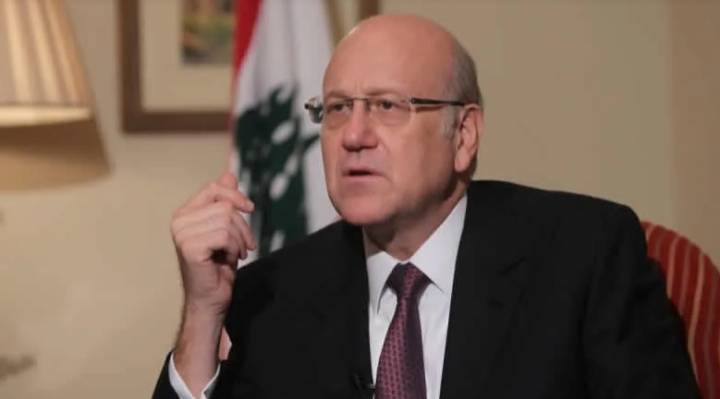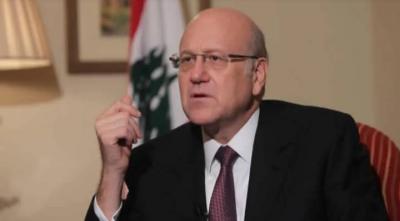Some believe that caretaker Prime Minister Najib Mikati is hesitant to call a Cabinet session with a single focus on electricity and the ships that cost Lebanon tens of thousands of dollars daily, leading to additional losses at a difficult and catastrophic time. He could use this opportunity to put pressure on the opponents and hold them accountable for the consequences of their actions on the Lebanese people. These individuals argue that Mikati has the authority but prefers not to provoke others, although it is also difficult not to exercise what the constitution grants him, allowing opposition forces to justify their refusal to meet. If it is necessary to make multiple contacts for this purpose, including with the Maronite Church, which recently aligned itself with the Free Patriotic Movement in its alleged defense of presidential powers while ignoring the needs of the people, then it should be done.
Some attribute Mikati's hesitance to a lack of conviction that he holds an important position that everyone still needs while he does not benefit from it. This is similar to the situation of Parliament Speaker Nabih Berri, currently considered the most powerful political figure in Lebanon, yet chooses not to leverage that to pull the country out of its deadly stagnation for various reasons. The focus on Mikati relates to the fact that his opportunity is significant at present, and he may not have another chance to be named as Prime Minister with the election of a new president for a very long time. Therefore, his failure to capitalize on this opportunity—whether through specific steps or by candidly explaining the ongoing situation to the public and revealing the true reasons for the obstacles—will leave him constrained and bearing the responsibility.
According to insiders, Mikati feels particularly constrained by the Christian faction amid broad campaigns against him by the Free Patriotic Movement, which has historically clashed with prime ministers. The other Christian forces do not engage in hostility but also do not offer support, especially following the recent stance of the Maronite bishops, which appeared to support the defense of what they consider to be presidential powers, prioritizing this over the tragedies and deteriorating conditions of the people.
This situation largely arises not from Mikati's lack of communication but from his neglect to explain matters to public opinion, while the electricity issue and any achievement in this area serve as significant leverage for him due to the drain it causes for all Lebanese people. Mikati's concerns stem from the worries expressed by the banking sector and related industries, as they impact Christian communities more than the Shiite community, which has fewer connections in these sectors. However, this does not mean there is a gradual or nonexistent approach to resolving the situation.
The constitution supports the caretaker government along with the ongoing needs of the people that require care and attention, especially amid the continuing presidential void. Furthermore, the situation is beginning to unravel on multiple levels in the country. There is no fundamental obstacle preventing the Prime Minister from taking the risk of addressing a single or a few urgent agenda items that would put pressure on all government forces. His responsibility and duty compel him to act, regardless of any animosity toward a political party.
It is clear that neither Mikati nor the Shiite duo intends to portray themselves in a way that diminishes or encroaches upon the powers of the presidency, even though their duty, like that of everyone, is to elect a new president. Nonetheless, a campaign of communications and targeted efforts to prevent further depletion could yield results in positioning the situation correctly, particularly since it is not in the interest of the Maronite community or its political and spiritual leaders to appear obstructive to the management of the country’s affairs, even if this suits some of these forces for self-interested political reasons. Meanwhile, the country continues to deteriorate and more of its citizens, especially Christians, are emigrating.
In light of recent communications with the Shiite duo, there is an understanding of the party's reluctance to convene the government, especially as the Free Patriotic Movement escalates its rhetoric by threatening to name candidates for the presidency, suggesting a retreat from the neutral voting approach that prevailed in the elections—the notion being that they wouldn't dare take such a step if they sense the party's unwillingness to support a Cabinet session.
There is a growing urgency regarding the needs of the Lebanese, from the Naameh landfill issue to the electricity crisis, which necessitates Mikati's call for a Cabinet meeting with a singular or few agenda items. All participants in the government, not just the Free Patriotic Movement alone, will share the responsibility for going along with this, as the Lebanese face calamities and see no one questioning the situation. This raises an essential question as to whether the obstruction of the caretaker government and its inability to address any issues under the pretext of preventing the exercise of presidential powers can genuinely put pressure on political forces to expedite the election of a new president, or if some are benefiting from this obstruction to bolster their positions for upcoming negotiations and gain additional leverage regarding the presidency and the future phase.
The government's issues before it even turned into a caretaker government stemmed from its failure to adequately explain its economic plan, its program with the International Monetary Fund, or any of its previous reform steps, and it is currently unable to do so. Even President Mikati, who previously outlined the government’s plan regarding tariff increases and the benefits that would return to citizens concerning what they pay for private generators, has not made the effort to explain all this to the Lebanese public to garner their support. This notably contrasts with the tax increase initially planned on WhatsApp, which triggered the protests of October 17, 2019.
Mikati is still inclined to call for a government session. Unless he possesses sufficient information about the possibility of electing a new president in the foreseeable future, the stalemate may worsen, and he will bear a greater share of the burden than others.




